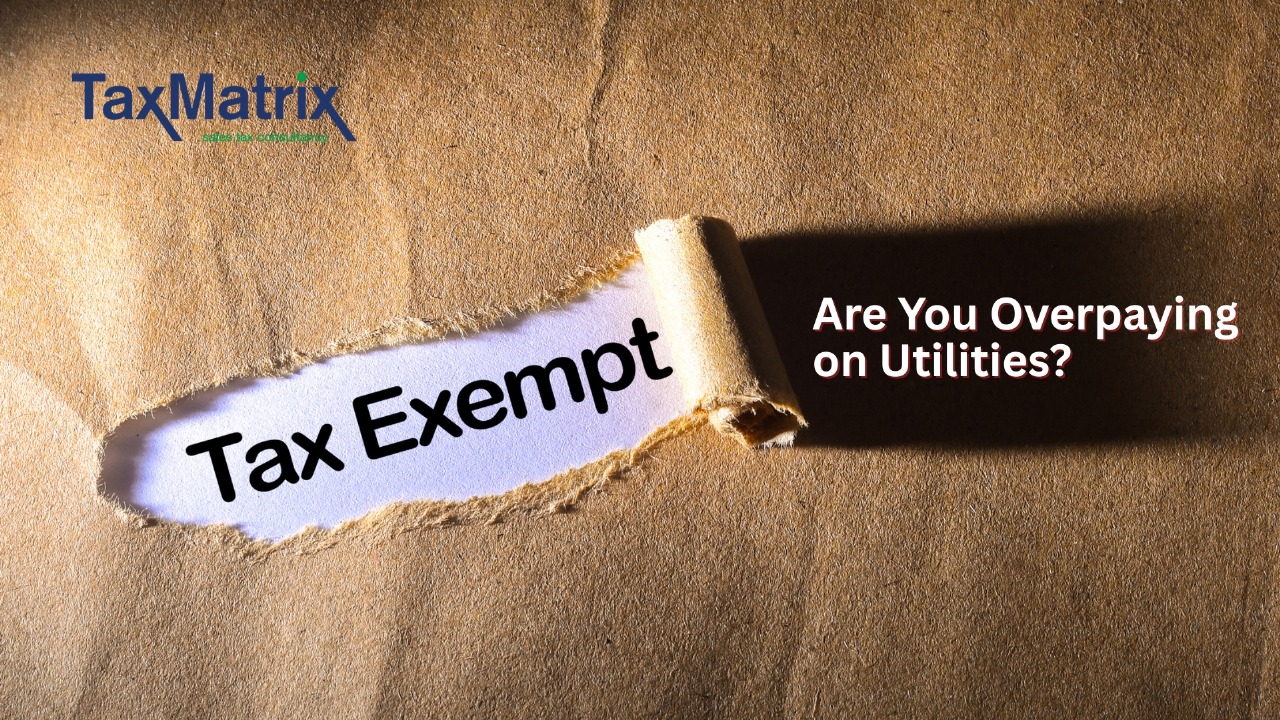Are You Overpaying Sales Tax on Utilities?
Last Updated on November 20, 2025
Utilities are one of the largest recurring expenses for manufacturers, processors, data centers, and industrial operators — yet many businesses unknowingly pay sales tax on utility usage that qualifies for exemption.
In many states, electricity, natural gas, water, steam, or fuel used directly in production is partially or fully exempt from sales tax.
In our previous blog, we discussed how businesses can uncover hidden profits through Sales & Use Tax Recovery. One of the biggest contributors to those refunds?
✅ Utility Exemptions.
Let’s break down why this matters and how much your business may be leaving behind.
Why Utility Exemptions Are So Commonly Missed
Unlike other tax exemptions, utility exemptions can’t be claimed by simply filling out a form. Many states require a utility study or predominant use study, often prepared by a licensed engineer. The study will provide the following:
- Meter readings showing tax-exempt vs. non-exempt consumption
- Engineering-based breakdown of production vs. non-production usage
- Line-by-line energy allocation tied to manufacturing processes
Unless an energy vendor is supplied with an exemption certificate, the business will be charged sales tax. In many cases, businesses simply pay the sales tax without knowing the exemptions available to them, or vendors change whereby exemption certificates were never transferred.
How Utility Exemptions Work
Most states allow a utility exemption when electricity, gas or water is “directly used in manufacturing, processing, research, agriculture or production.”
That means the utilities used to:
✔ Run machinery
✔ Power production lines
✔ Operate processing equipment
✔ Maintain environmental control for products
✔ Support refrigeration, welding, curing, or chemical reactions
…may legally qualify for partial or full tax exemption.
However:
✘ Office HVAC
✘ Lighting for admin areas
✘ Employee break rooms
✘ General facility usage
…do not qualify.
States generally have two different types of exemptions: apportionment and predominant. For apportionment usage, only the portion used in production will be exempt from sales tax. For predominant, if the portion used in production is over 50%, the entire bill is exempt from sales tax. For Indiana, businesses that perform R&D only will qualify for the apportionment exemption, while manufacturers qualify for the predominant use exemption. This interactive map shows the utility exemption employed by each state.
How Much Can Businesses Recover?
Businesses can recover overpaid sales tax on utilities by following the state statute. In the case of Missouri, the state has a 10-year look-back period (if refunds have not been filed previously), so let’s consider a small metal foundry.
The metal foundry has a $10,000 electricity bill per month.
That bill indicates $365 is state sales tax and $400 is local sales tax. Up until January 2023, local sales tax was not exempt for manufacturers, so the business – if it qualifies for a full exemption – can recover $43,800 in state sales tax and $14,400 in local sales tax (3 years under the local sales tax provision), totaling: $58,200. This would not include refunds on gas usage (if any).
While recovering dollars to improve your bottom line and increase cash flow is important, the utility study can now be used to create an exemption certificate whereby the business will no longer be charged sales tax on a go-forward basis. Many businesses, dependent on square footage and output, can pay thousands of dollars in sales tax a month on utilities, so a utility study and refund review is a best practice.
Questions? Speak to a Tax Recovery Specialist
For over 25 years, TaxMatrix has serviced the manufacturing industry, working with regional companies to multi-state operators on sales & use tax recovery and audit defense. Our recovery service, also known as a refund review or reverse audit, is performed on a success or contingency basis with no upfront fees or costs.
If the taxpayer is paying sales tax on utilities used in production, we will bear the cost of performing a utility exemption study as part of our review. Furthermore, we provide free process improvement assistance for exemption certificate implementation and avail our free Tax Help Desk for ad hoc sales and use tax support.
If you would like more information or would like to set up a free consultation, please contact us today!
FAQs
- What is a Utility Study?
A technical analysis that measures how much utility usage is tied to production vs. non-production activity — required to claim exemption or refunds.
- How many years back can utility refunds be filed?
Most states allow 36–48 months of historical refunds.
- Does every business qualify?
No — mostly manufacturers, processors, agricultural operators, labs, cold storage, and certain data centers.
- How does this connect to Sales & Use Tax Recovery?
Utility refunds are one of the top contributors to high-dollar refund claims in recovery projects. They are part of a complete Sales & Use Tax Recovery strategy.
- How does this relate to choosing the right recovery partner?
Only a qualified partner can:
✔ Perform a compliant utility study
✔ File the exemption properly
✔ Defend the claim during audit
✔ Secure ongoing exemption to stop future overpayments


